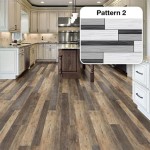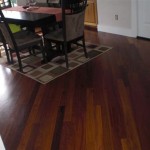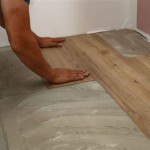Choosing the Right Laminate Flooring Thickness
Laminate flooring is a popular and durable option for many homes and commercial spaces. It is available in a wide variety of colors, styles, and thicknesses. Choosing the right thickness is an important factor to consider when selecting laminate flooring, as it will affect durability, cost, and ease of installation.
Factors to Consider When Choosing Laminate Flooring Thickness
There are several factors to consider when choosing the right laminate flooring thickness:
* Traffic Level: The thickness of the laminate flooring should be appropriate for the intended traffic level. Heavy traffic areas, such as hallways and entryways, require thicker laminate flooring to withstand wear and tear. * Subfloor Type: The type of subfloor can also affect the thickness of the laminate flooring. Uneven subfloors may require a thicker laminate to provide a smooth surface. * Underlayment: Underlayment is a layer of material installed under the laminate flooring to provide additional cushioning and support. A thicker underlayment can help to reduce the need for a thicker laminate flooring. * Budget: Laminate flooring thickness can also affect the cost. Thicker laminate flooring is typically more expensive than thinner laminate flooring.Standard Laminate Flooring Thicknesses
Laminate flooring is typically available in three standard thicknesses:
* 5mm Thick Laminate Flooring: This is the thinnest laminate flooring available. It is suitable for light traffic areas and can be installed over existing flooring. * 7mm Thick Laminate Flooring: This is a mid-range thickness laminate flooring. It is suitable for most residential applications and light commercial applications. * 12mm Thick Laminate Flooring: This is the thickest laminate flooring available. It is suitable for heavy traffic areas and commercial applications.Benefits of Thicker Laminate Flooring
There are several benefits to choosing thicker laminate flooring:
* Durability: Thicker laminate flooring is more durable and can withstand more wear and tear. It is less likely to scratch or dent and is better suited for high-traffic areas. * Stability: Thicker laminate flooring is more stable and less likely to buckle or warp. It is a good choice for uneven subfloors or areas with high moisture levels. * Sound Absorption: Thicker laminate flooring has better sound absorption properties than thinner laminate flooring. It can help to reduce noise levels in a room.Choosing the Right Laminate Flooring Thickness for Your Project
The right laminate flooring thickness for your project will depend on the factors discussed above. If you are unsure which thickness is right for you, consult with a flooring professional.
Additional Tips
Here are some additional tips for choosing the right laminate flooring thickness:
* Consider the underlayment you will be using. A thicker underlayment can help to reduce the need for a thicker laminate flooring. * If you are installing laminate flooring over an existing floor, make sure to check the height of the transition moldings. You may need to use a thicker laminate flooring to ensure a smooth transition. * If you are unsure which thickness is right for you, consult with a flooring professional.
Laminate Flooring Thickness Guide Blog Floorsave

Laminate Flooring Thickness Guide Blog Floorsave

The Optimal Thickness For Engineered Wood Flooring And Beyond Blog

Luxury Vinyl Flooring Lvt And Lvp Thickness Guide Wood Beyond Blog

Laminate Flooring Types And S Forbes Home

How To Choose Laminate Flooring Thickness Parrys Carpets

Flooring 101 Choosing The Right Width For Your Wood Floor Carlisle Wide Plank Floors

Laminate Floor Guide Lowe S

Lvt Flooring Thickness Floor

Ultimate Guide To The Best Thickness For Lvp Flooring Floorings
See Also







